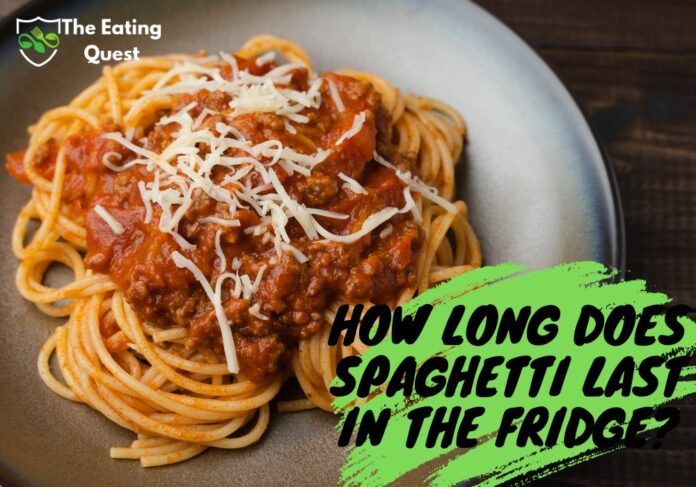Have you ever cooked too much spaghetti and wondered How Long Does Spaghetti Last in the Fridge? It’s a common question for anyone who wants to save time and money by cooking in bulk. The answer is not straightforward, but you can make your spaghetti last for up to five days in the fridge with the right storage techniques.
The shelf life of cooked spaghetti depends on several factors, such as the storage temperature, the type of sauce used, and how it was prepared. If you store your spaghetti in an airtight container and refrigerate it within two hours of cooking, it can last up to five days.
However, if you leave it at room temperature for more than 2 hours, bacteria can grow and become unsafe to eat. Additionally, using a cream or meat-based sauce may spoil faster than a tomato-based sauce.
What is Spaghetti?
Spaghetti is a long, thin, and cylindrical pasta. It is one of the most popular pasta types in the world and is commonly served with tomato sauce, meatballs, or other sauces and toppings.
Spaghetti is typically made from durum wheat semolina, a type of hard wheat high in protein and gluten. However, gluten-free spaghetti options are also available that are made from alternative flour such as rice or corn.
There are two main types of spaghetti: dry and fresh. Dry spaghetti is the most common type and is typically found in the pasta aisle of grocery stores. It is made by mixing semolina flour with water and then extruding the dough through a machine to create long, thin strands. On the other hand, fresh spaghetti is made from a mixture of flour and eggs and has a softer texture and shorter shelf life.
Spaghetti is just one type of pasta, and many other varieties are available, including stuffed pasta like tortellini and macaroni. Homemade pasta is also becoming increasingly popular, allowing for more customization and control over ingredients.
How Long Does Spaghetti Last in the Fridge?
If you have leftover spaghetti, you might wonder How Long Does Spaghetti Last in the Fridge? Spaghetti can last up to 5 days in the fridge if properly stored. However, some factors can affect its shelf life.
Proper storage is important to keep your spaghetti fresh and safe to eat. Here are some factors that affect spaghetti shelf life: how to properly store spaghetti in the fridge and tell if spaghetti has gone bad.
Factors that Affect Spaghetti Shelf Life
- Contamination: If spaghetti comes into contact with bacteria or mold, it can spoil more quickly.
- Storage: Spaghetti that is not stored properly can spoil faster.
- Quality: The quality of the spaghetti can also affect its shelf life. Store-bought, shelf-stable pasta can last longer than homemade pasta or fresh pasta.
How to Properly Store Spaghetti in the Fridge?
To properly store spaghetti in the fridge, you should follow these steps:
- Place the leftover spaghetti in an airtight container or a resealable plastic bag.
- Add olive oil to the spaghetti to prevent it from drying out.
- Label the container or bag with the date that you stored it.
- Store the spaghetti in the fridge at a temperature of 40°F or below.
How to Tell if Spaghetti Has Gone Bad?
If you are unsure whether your spaghetti has gone bad, here are some signs to look out for:
- Discoloration: If the spaghetti had turned a different color than when you stored it, it might be spoiled.
- Slimy texture: Spaghetti might be spoiled if it feels slimy or sticky.
- Bad smell: If the spaghetti has a sour or musty smell, it might be spoiled.
If you notice any of these signs, it is best to throw the spaghetti away to avoid any risk of food poisoning.
In conclusion, proper storage is important to keep your spaghetti fresh and safe to eat. Following these tips, you can ensure that your leftover spaghetti stays fresh for up to 5 days in the fridge.
How to Store Spaghetti Sauce?
When storing spaghetti sauce, you should keep a few things in mind to ensure it stays fresh and safe to eat. Here are some tips to help you store your spaghetti sauce properly:
Refrigerate Leftovers Promptly
If you have leftover spaghetti sauce, it’s important to refrigerate it promptly to prevent bacteria growth. According to the USDA, you should refrigerate perishable foods within 2 hours of cooking or purchasing. If the temperature is above 90°F, you should refrigerate within 1 hour.
Store in an Airtight Container
Store your spaghetti sauce in an airtight container to keep it fresh. This will help prevent air from getting in and causing freezer burn or spoiling the sauce. You can use a plastic container or a freezer-safe glass jar with a tight-fitting lid.
Freeze for Longer Storage
If you plan on using your spaghetti sauce after a few days, you can freeze it for longer storage. Spaghetti sauce can be frozen for up to 3-4 months. To freeze, transfer the sauce to a freezer-safe container and leave about an inch of space at the top to allow for expansion.
Reheat Properly
When reheating spaghetti sauce, it’s important to ensure it reaches a safe temperature to prevent foodborne illness. It would be best to heat the sauce to an internal temperature of 165°F. You can reheat the sauce in the microwave or stove, stirring occasionally to ensure even heating.
Consider Adding Meatballs or Sausage
If you plan on adding meatballs or sausage to your spaghetti sauce, it’s important to cook them thoroughly before adding them. This will help prevent bacteria growth and ensure they’re safe to eat. You can cook the meatballs or sausage separately and then add them to the sauce or cook them in the sauce itself.
By following these tips, you can ensure your spaghetti sauce stays fresh and safe to eat. Whether storing leftovers or preparing a big batch for later use, proper storage is key to keeping your sauce delicious and healthy.

Can You Freeze Spaghetti?
If you have leftover spaghetti and you’re wondering if you can freeze it, the answer is yes! Freezing cooked spaghetti is a great way to extend its shelf life and reduce food waste. However, following the proper steps to ensure that the spaghetti stays fresh and tasty when you thaw it out is important.
How to Freeze Spaghetti?
Here’s how to freeze spaghetti properly:
- Let the spaghetti cool down to room temperature. Please do not leave it out for more than two hours.
- Portion the spaghetti into freezer-safe containers or resealable bags. Label the containers with the date and contents.
- If you’re freezing spaghetti with sauce, leave some room at the top of the container or bag to allow for expansion during freezing.
- Place the containers or bags in the freezer.
How to Thaw Frozen Spaghetti?
When you’re ready to eat the frozen spaghetti, you can thaw it in the refrigerator overnight. Here’s how to do it:
- Take the container or bag of frozen spaghetti out of the freezer and place it in the refrigerator.
- Let the spaghetti thaw in the refrigerator for at least 12 hours.
- Once the spaghetti is thawed, you can reheat it in the microwave or on the stovetop.
It’s important to note that frozen spaghetti should be consumed within two months for the best quality. After that, the spaghetti may start to lose its freshness and flavor.
In summary, freezing leftover spaghetti is a great way to reduce food waste and extend the shelf life of your food. Follow these simple steps to freeze and thaw spaghetti properly, and you’ll be able to enjoy it again in no time.
Conclusion
In conclusion, storing leftover spaghetti in the fridge is a great way to extend its shelf life. However, it is important to follow proper food safety guidelines to ensure the spaghetti remains safe. Here are some key takeaways to keep in mind:
- Airtight containers are the best way to store leftover spaghetti in the fridge. This will help prevent the spaghetti from drying out and absorbing unwanted odors from other foods in the fridge.
- It is important to keep your refrigerator temperature at or below 40°F (4°C) to prevent the growth of harmful bacteria. This is especially important for cooked spaghetti, which can quickly become a breeding ground for bacteria if left at room temperature for too long.
- When reheating leftover spaghetti, use a clean utensil to avoid cross-contamination. This will help prevent the spread of bacteria and other harmful pathogens.
- While Barilla recommends consuming leftover spaghetti within 3-5 days, food safety experts generally suggest consuming it within 2-3 days to be safe.
- If you notice any spoilage, such as a sour smell or mold growth, it is best to err on the side of caution and discard the pasta.
By following these tips, you can safely enjoy leftover spaghetti for several days after it has been cooked. Always prioritize food safety and use your best judgement when determining whether or not to consume leftover pasta. I hope you enjoy the information provided in this article, please visit theeatingquest.com again to read more about food facts.
Also Read:
















